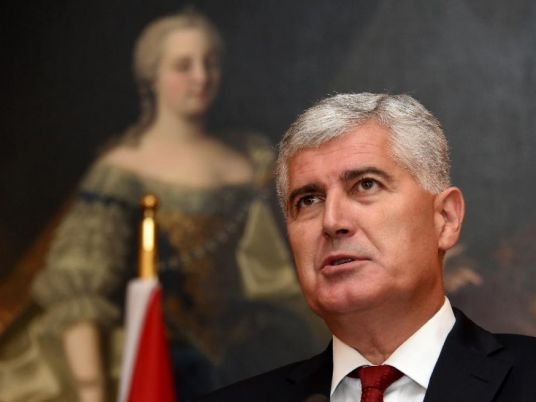
Bosnia on Monday formally submitted an application to join the EU, hoping to catch up with its Balkan neighbors after years lost following the bloody break-up of Yugoslavia.
In the early 2000s, Bosnia appeared set to join the now 28-nation European Union but deep divisions between its Serb, Croat and Muslim communities blocked the political and civil society reforms demanded by Brussels for membership until last year.
Dutch Foreign Minister Bert Koenders, whose country holds the six-month EU rotating presidency, said the bloc was happy to see "Bosnia back on the reform path".
"It is urgent to maintain the positive momentum by continuing to implement reforms," Koenders said, stressing that the EU would look carefully at what would likely take some years.
Dragan Covic, the chairman of Bosnia's tripartite presidency, said he submitted the application on behalf of all the people of Bosnia-Hercegovina — Croats, Serbs and Bosniaks.
Covic noted that Croatia had joined the bloc in 2013, while Serbia and Montenegro were now making progress towards membership too.
Facing "years of many challenges ahead," Bosnia needed to improve its economy and show that it could be a "credible" member of the EU, he said.
'Unity in challenging times'
EU foreign affairs head Federica Mogherini and EU Enlargement Commissioner Johannes Hahn said in a statement that the Yugoslav wars of the 1990s "were one of the most awful pages of European history".
The fact that Bosnia now wanted to join the EU, even when the European project was being tested to the limit, showed how important it was to the future, they said in a joint statement.
"Today we celebrate another step towards a united and peaceful continent. And we need unity in challenging times," they said.
"As some forces across our continent are questioning the very existence of our union, Bosnia and Herzegovina's application shows that the need of a united European continent is still strong among our peoples."
Bosnia has been deeply divided along ethnic lines since the bitter 1992-1995 war following the break-up of Yugoslavia.
The Balkan nation's EU bid was stalling for years. Trying to push unblock the process, Brussels in 2014 adopted a new approach to the country, under the leadership of London and Berlin, and focused on reforms to revive the economy instead of difficult constitutional issues.
Bosnia's unemployment rate is more than 40 percent, among the highest in Europe.
Bosnian political analyst Tanja Topic said violent protests in February 2014, when demonstrators set fire to government buildings in anger at the country's social and economic situation, were a "turning point."
"It was then that Brussels realised a bad situation that the country was facing," she told AFP.
Submitting the application was "important at least symbolically to mark a break with a discouraging stagnation period which lasted eight years," Topic added.
Bosnia's Dnevni Avaz newspaper warned that there should be "no illusions" over the country's EU aspirations.
"Submitting the application for membership does not mean that the doors of Europe are wide open. The hardest work starts as of today," the paper's editorialist Erol Avdovic wrote.




